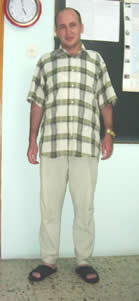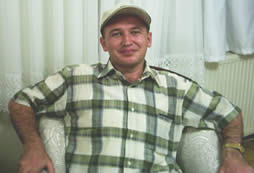The Caucasus News Agency Meets Haci Bayram Polat, the Returnee who was Deported from his Homeland — Part 1
January 2, 2011
The Caucasus News Agency Meets Haci Bayram Polat, the Returnee who was Deported from his Homeland
“They asked me to become an agent but when I refused, all the problems started”
Interview conducted by Fehim Tastekin
Part One
Haci Bayram Polat was born in Turkey’s Churum Province in 1974. In 1992 he returned to the Caucasus. His story is now the talk of the town and his case has become a symbol and an example of the position taken or will be taken by the Russian Federation and the Republic of Kabardino-Balkaria toward those who returned to Motherland or those who intend to do so.
After his legal struggle in the legal arena to stay on the soil of his homeland was almost won, Haci Bayram was deported from his homeland, and was returned to Turkey in violation of the law. This completely violates all the principles of human rights. On his visit to the Caucasus News Agency, Haci Bairam Polat held the following interview:
— When and how did you start your Caucasian adventure?
In 1992, I went to the Caucasus, which was my first visit. I went then to Makhachkala, the capital city of Dagestan at the invitation of one of my acquaintances.
— And why did you go to Makhachkala, not Kabardino-Balkaria, being a Kabardian by origin?
I view the Caucasus as an indivisible whole. The reason that I went to Makhachkala was, as I said earlier, one of the specialists in the Turkish language, whose named Ahmed Mortazaliev has invited me to go there.
— Was the purpose of this visit for tourism or a return to Motherland?
Of course I went to Makhachkala to return home. I stayed in the Dagestani capital for about three years, and then went to Nalchik, the capital city of the Republic of Kabardino-Balkaria, my Motherland. I wanted to continue my academic academic studies there and to find a job. My goal was to work with the intellectual circles in Russia.
— Have you been able to reach the goals that you wanted to achieve in the academic field?
I have studied at the State Education Institute in Dagestan and worked as a public relations consultant for a private company. After that, I transferred myself from this institute to an institute in Karachay-Cherkessia that is linked to the language institute in Moscow, where I completed my studies in the Turkish language department. After that, I was chosen as the head of the international relations department at the “Turki” Academy, which is in the structure of the Russian Academy of Sciences. The Turki Academy has done something that rarely happens, since they have written on my certificate the following note: He can pursue his high studies.
— Were you still in relationship with this academy when your deportation attempts began?
I was chosen for a five years term that has not yet ended.
— Did you feel nostalgic for the Caucasus homeland?
If I had come to Turkey in 1999 my situation would have been much better. I was able to work in Turkish universities more easily and I would have lived with much better possibilities than in the Caucasus. But my main goal was to return to the homeland.
— How did the attempts of deporting you from homeland begin?
In 1999, KGB suggested that we shall “work together,” but I refused. They told me: “If you work with us, you will not face any problems and we will grant you the Russian citizenship,” but I did not accept their offer. (Currently known as Russian intelligence FSB, but still called until now as KGB, the way it was called during the Soviet era. Fehim Tastekin)

— And do they suggest something like this to everyone?
I think that they suggest it to a lot of people.
— Good, and what happened when you refused?
They told me: “We will make you regret this,” and then the main problems started.
— What happened next?
In 2000 my permanent residence permit was stolen, when I was sitting in one of the restaurants in Cherkessk.
— Was this a KGB action?
I think it was done intentionally.
— Why?
Because, when I contacted the relevant authorities in Nalchik to obtain a residence permit again, the Head of the Immigration and Passports Department, Colonel Muayed Jamukhov, told me: “The Interior Minister does not allow us to give you a residence permit.” Which made me suppose that my residence permit had been deliberately stolen.
— Was rejecting the KGB offer your only sin? Have they shown you any other reasons?
They told me that the reason was for my knowledge of effective people from different categories. The other reasons they said were not drinking alcoholic drinks and because I speak several languages
— Have they told you about these matters formally?
Yes. They told me that I would be deported beyond the borders as soon as possible. I told them that I would go to court, which they answered by saying, “you have no right to report to the court.”
— When did these events happen exactly?
In the year 2000. After that I reported to the court where my lawsuit was unprecedented in the courts of the North Caucasus. I have filed a lawsuit against the Ministry of the Interior and the FSB. The case was filed on May 6, and the hearing was held on June first, 2000.
— Why did you sue the FSB? Wasn’t your case with the Ministry of the Interior?
Basically, the party who did not want my presence was the FSB. However, it was the Ministry of Interior that took charge. By law, intelligence could not intervene.
In court, the representative of the Ministry of Interior said that “FSB do not approve Polat.” Of course, these words were recorded in court records. After that, something remarkable happened, where the representative of the Ministry of Interior was removed from his position, because the title of the Russian Intelligence Service has been indicated in the court records, which placed the FSB and Russia in a very difficult position. This proves that the old Soviet system is still active.
Also, the president of the court that is hearing the case has faced problems when he reported to the parties concerned to extend his stay at the end of the current year. Judges who have been practicing their job for 10 years can always practice it, which would be approved by the Kabardino-Balkarian Parliament and the Supreme Judges’ Committee.
The FSB have adopted a lot of pressure to prevent this from happening, but the request by the judge who is in charge of my case was accepted by only one vote difference.
— If it turned out that the FSB is interfering with the case. How did this affect the court’s decision?
The court forced the Ministry of the Interior to grant me a residence permit.
— Did the Ministry of Interior offer you residence permission based on this decision?
Yes.
— What happened next and why did the problem persisted? was the permission revoked?
On December 11, 2002, I went to the house of one of my friends and stayed over that night with him. In the morning, Captain Marianna Atabyeva, and an employee of the FSB, had raided my friend’s house, which is located in “Furmanov” Street in the capital Nalchik. Nalchik is divided into three areas, and the area where my friend’s house is located is in the third area regarding the Security Service, however, Captain Marianna Atabyeva was from the second area, the area where the Russian intelligence building is located. I live in the first area. And its registered in my residence permit that I live in the first area. Atabyeva asked me to show my personal papers and when I showed her the residency permit, she told me: “Why are you here?” I replied, “I am a guest here.” They took me out of the house, without considering my friend’s objection. They arrested me and took me to the second area post. The Head of the post, Colonel Jamburov Naurbi, sent me to the third area. The Head of the third area, Shamil Bishoyev refused to investigate me by saying: “There is no such crime in our region. Being a guest is not a crime.” Then they took me back to the second area.
After six hours of detention, Captain Marianna Atabyeva, prepared against me an administrative penalty proceeding on the grounds that I committed an administrative violation and I was fined 500 rubles.
According to one of the provisions of Russian law: “District and city courts shall consider incidents relating to article 18 / 8.” However, an officer in the Ministry of the Interior who made a decision in my case, while the decision had to be made by the court. This is a crime under the laws of the Russian Federation, which means that Captain Atabyeva has committed a crime.
And what did you do about that?
ّI reported to the city court on December 24, 2002, where the the presiding judge of the court, was Batterby Bizrokov. The police did not attend the court. The court annulled the administrative and financial penalty imposed on me and stated that I am not violating any of the laws. However, the Ministry of Interior resorted to appeal to the Supreme Court of Kabardino-Balkaria, which rescinded the decision on a funny pretext and sent the file of the case to the local court for a retrial. The argument was that the recorded text was carried out on a photocopy paper.
On February 26, 2003, the Naltchk City Court ruled that what the Ministry of Interior officials had done was legal as well as the administrative punishment. The court gave its decision based on the reports written by the police of the two areas. However, both of these policemen said in the court that they did not see me and did not know what was my fault, which was in my favor. The witnesses said that I was only a guest at that house.
(Caucasus News Agency)
http://www.kafkas.org.tr/arabic/Ajans/2003/Agustos/15.08.2003_bolat_reportaj_1.htm
Translated by: Adel Bashqawi.

